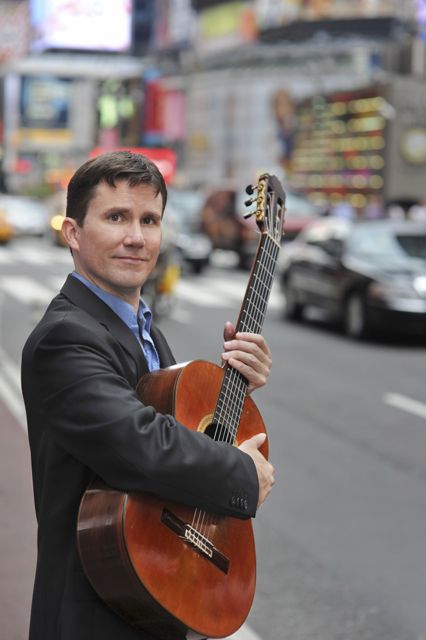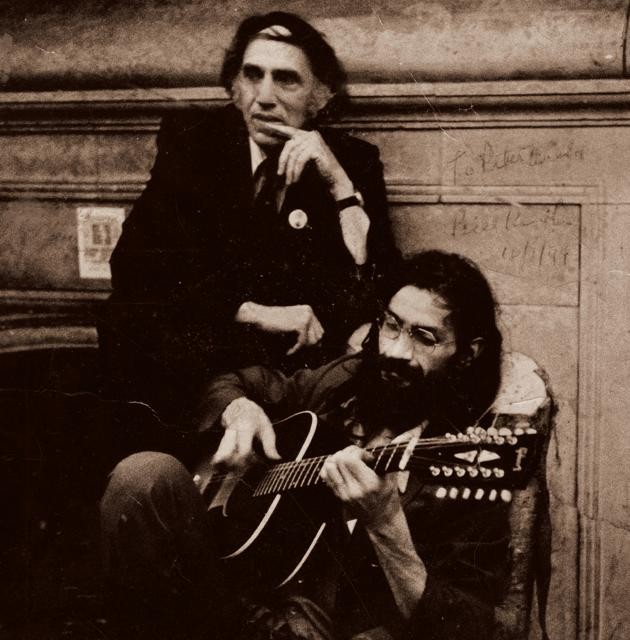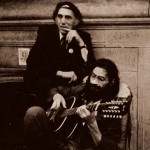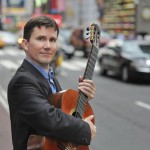- Lost and found: Guitarist Peter Walker appears in a vintage photo with radical lawyer William Kunstler on the cover of Has Anybody Seen Our Freedoms. The album was just released after 43 years in storage. Photo by John Collier
- Past and present: Peter Fletcher‘s latest album, which features his transcriptions from the Norwegian Romantic-era composer Edvard Grieg, will be released this month. Photo courtesy of the musician
Guitarist Peter Walker appears in a vintage photo with radical lawyer William Kunstler on the cover of Has Anybody Seen Our Freedoms. The album was just released after 43 years in storage. Photo by John Collier
Does the mention of a guitar conjure thoughts of screaming electric solos or folky strumming or the person leading the roots/rock/indie/blues/soul/funk band in question? All of the above are standard territory of the ubiquitous ax. But two musicians playing Asheville this week are putting their six strings to different uses. Septaugenarian Peter Walker, who studied with Ravi Shankar and Spanish Gypsies, brings his raga-meets-Flamenco style to The Mothlight on Monday, Feb. 10. Peter Fletcher, a generation younger, was also inspired by a Spanish teacher. Now a renowned classical guitarist (he’s performed at Carnegie Hall), he’ll appear at the Masonic Temple on Saturday, Feb. 8.
Vision quest
Guitarist Peter Walker has a plan for those droning tones he creates. “I want to take your mind right out of where it is,” he says. “I want to take you to some beautiful place, lead you around in that garden and bring you back intact.” It’s a similar idea to what he was doing almost half a century ago as the musical director for Timothy Leary’s LSD experiments.
Those chemically and sonically enhanced trips ended around 1970, but Walker, who also studied with Ali Akbar Khan, was working on his own music projects. That year, he recorded the seven tracks that would have been his third studio album.
But instead of releasing the record, Walker packed the tapes away in a converted bread truck. For 43 years. “For an artist, once it’s done, it’s done,” he says. “I put the love into the craftsmanship, but once it’s done, I don’t really care too much about it.”
The musician, now 75, adds, “At the time I recorded this, there was nobody offering to distribute it who was making any kind of a decent deal. Frankly, I’d rather sit on it than get screwed.” In 2013, the stars aligned. Walker edited the tracks and finally released an album that he liked. Last November, the world got to hear the East-meets-West, folk-meets-trance Has Anybody Seen Our Freedoms? Its offerings range from the shimmery “Grey Morning Sun” (which name-checks Woodstock ) to the old English ballad “The Cuckoo,” re-envisioned as the moody, rhythmic “Pretty Bird.” Walker’s singing, accompanied by his dynamic 10-finger plucking style, is also meditative and raga-like.
The collection takes its title from a verse in the ambling, light-dappled romance “Me and My Lady.” It’s a sentiment both political and personal and one that the guitarist says is as pertinent now as when he wrote it. “Everything’s come full circle,” he says. “If this had been released in 1970, it would have been premature for its time.”
Something else that’s come full circle: “All of those songs are love songs to a specific person I traveled with for a couple of years back in that era,” Walker says. “Now I’m finally talking to them again.”
Not that the guitar player passed those intervening four decades resting on his laurels. A writer and world traveler, he currently spends two months of the year in Peru. He used to travel between the U.S. and Spain, where he studied Flamenco guitar and eventually established a career with a Gypsy band in Seville. The original Spanish Gypsies, who came to the country in the eighth century, brought with them music based on the Carnatic system — the same progenitor is shared by Indian ragas. “It was the smoking gun, the connection between East and West, right there in the city of Granada,” Walker says.
The liner notes for Freedoms contain more stories, excerpted from Walker’s forthcoming book, Light Upon The Path. “I had come in over the mountains from the east, the first gringo ever to come directly from Guadalajara, in an old Oldsmobile hard top convertible held together with baling wire and prayers,” he writes. “The last half-day was on the back of a cattle truck, but it was an incredible adventure and the story appears on the album as ‘Fifty Miles’ (on two flat tires).”
Now back on the road to tour (“Seeing America, what a great country,” the musician says), Walker is ready to share his long-lost songs. But his greatest adventures seem to revolve around personal achievements. “What I do each day is play something in every key. You find your weak points and you work on them,” he says. “When you get to the end, you’re at the beginning again.” — A.M.
who: Peter Walter with Rayna Gellert and Rafi Bookstaber
where: The Mothlight, themothlight.com
when: Monday, Feb. 10, at 8 p.m. $8.

Past and present: Peter Fletcher‘s latest album, which features his transcriptions from the Norwegian Romantic-era composer Edvard Grieg, will be released this month. Photo courtesy of the musician
Recipe for a concert
Classical guitarist Peter Fletcher may be touring in support of his latest transcriptions of piano music by Romantic-era composer Edvard Grieg. But when it comes to performing live, he takes a cue from a different kind of musician — rocker Pete Townshend.
“Pete Townshend used to say that when The Who started out, and when they started to get big, they would give these concerts,” says Fletcher. “He said the connection between the performers and the audience was so strong, that they kind of just forgot that there was an audience and a performer, they all just became one. … He said that’s the epitome of a live performance, when everyone feels equal, when everyone feels like they’re a part of it, and you don’t have this separation between performer and audience.”
Fletcher seeks the same phenomenon during his own shows. To achieve this, he creates a very particular shape for his concerts aimed at creating an exchange of energy and connection with the audience.
Fletcher compares that shape to a meal.
“A classical guitar concert needs to have an arc,” he says. “In the basic arc that I use, I start out with something that has a lot of energy. If the energy isn’t there, it’s just going to die. That goes for a rock ’n’ roll concert or a folk concert or classical.”
After the attention-grabbing first piece, Fletcher moves on to something quiet to bring the energy back down. After that, he says, “I’ll play what I consider the meat and potatoes of the concert — Johann Sebastian Bach, whatever is the most serious.” This is typically followed by a Spanish piece “to reward them for sitting through the serious stuff,” he adds with a chuckle.
The second half of the concert is what Fletcher considers “dessert music” — music that is more accessible, including well-loved songs that people have heard before.
“If the concert were all serious, it’s kind of pushing the audience too hard,” says Fletcher. “If it’s all dessert music, that’s not good either because as my teacher used to say, ‘Too much sunshine makes a desert.’ … Having that arc, it’s kind of a cat-and-mouse game with the audience that you play in order to connect.”
On the current tour, audiences’ sweet tooths will be rewarded with Fletcher’s Edvard Grieg transcriptions. The guitarist says he’s been fantasizing about doing a Grieg album since he was a teenager (perhaps giving us a little insight into Fletcher’s atypical adolescent years). His transcriptions — and his ability to identify music that will sit well on the guitar — are really what sets him apart in the world of classical music.
Certainly, he identified a good opportunity for transcription in Grieg. The songs on Fletcher’s latest record were composed during the height of the Romantic period, and the mood of the era shines through brightly on the guitar. Each piece conjures up pleasant feelings and scenes. One piece called “Cradle Song” is a kind of lullaby that calls forth warm images of a mother singing to her child.
Fletcher plays a cedar-top guitar for the Grieg pieces. The softer wood has a warmer, sweeter sound that he says is better suited for music from the Romantic period. For the early and Baroque pieces that precede the “dessert round” à la Grieg, Fletcher plays a spruce-top guitar that lends more clarity and texture to the music of Bach and others.
By including a good mix of well-known and more challenging pieces, Fletcher hopes to engage the majority of his concertgoers with tastes that will both please and expand their palates. “I think music lovers fall into three categories,” says Fletcher. First, “they really love classical guitar, and they know all about it. The second category would be classical guitar just isn’t for them and that’s fine. Then there is this third category of people who don’t know much at all about classical guitar, but if they heard it, they would love it.” Fletcher takes special care to reach out to the latter.
And of course, it is worth noting that in addition to the main course and dessert, Fletcher promises some tried and true Spanish pieces. As he puts it, “You can’t give a good classical guitar concert without playing some flashy Spanish music.” — L.M.
who: Peter Fletcher
where: Asheville Masonic Temple, mounthermon118.com
when: Saturday, Feb. 8., at 7:30 p.m.






Before you comment
The comments section is here to provide a platform for civil dialogue on the issues we face together as a local community. Xpress is committed to offering this platform for all voices, but when the tone of the discussion gets nasty or strays off topic, we believe many people choose not to participate. Xpress editors are determined to moderate comments to ensure a constructive interchange is maintained. All comments judged not to be in keeping with the spirit of civil discourse will be removed and repeat violators will be banned. See here for our terms of service. Thank you for being part of this effort to promote respectful discussion.